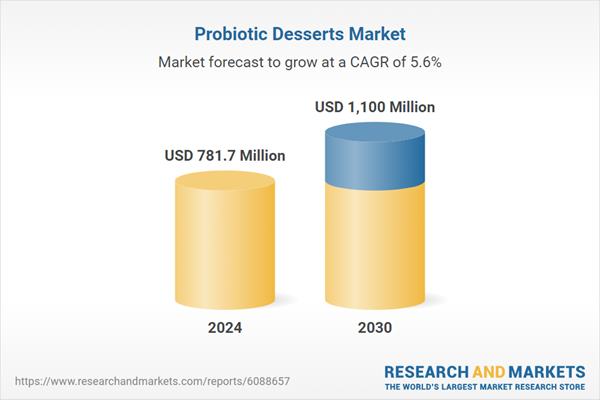Global Probiotic Desserts Market - Key Trends & Drivers Summarized
Why Are Probiotic Desserts Gaining Ground Among Health-Conscious Consumers Worldwide?
Probiotic desserts represent the intersection of indulgence and wellness, offering consumers the dual benefit of digestive health support and sensory satisfaction. These functional desserts incorporate live probiotic cultures-such as Lactobacillus and Bifidobacterium strains-into yogurts, frozen treats, puddings, cheesecakes, and even plant-based formulations. They aim to promote gut microbiome balance while catering to the growing demand for healthier alternatives to traditional desserts laden with sugars and saturated fats.This product category is especially attractive to consumers who seek “better-for-you” products without compromising on taste and texture. The shift toward preventive healthcare, awareness of gut-brain axis linkages, and rising prevalence of gastrointestinal issues are increasing consumer acceptance of functional foods. Millennials and Gen Z, in particular, are prioritizing gut health and clean label products, fueling demand for probiotic-infused snack and dessert innovations that align with broader lifestyle wellness trends.
How Are Formulation Advances and Novel Carriers Enhancing Market Differentiation?
Innovations in food science have enabled the development of probiotic dessert formats that maintain microbial viability without sacrificing texture, flavor, or shelf life. Microencapsulation technologies and heat-stable probiotic strains are being used to ensure survivability through production, storage, and digestion. These breakthroughs allow the incorporation of probiotics into non-refrigerated dessert formats, such as snack bars and dry mix puddings, widening distribution channels beyond cold chains.Product developers are expanding into dairy-free and low-sugar segments by using coconut, almond, oat, and soy-based matrices as alternative carriers for probiotics. This allows brands to cater to lactose-intolerant, vegan, or diabetic consumers without compromising the functional integrity of the product. Additionally, natural sweeteners like monk fruit and stevia, as well as prebiotic fibers like inulin and FOS (fructooligosaccharides), are being added to improve gut health synergy and offer a complete digestive wellness proposition. These formulation trends are redefining probiotic desserts as both indulgent and functionally superior to traditional options.
Where Is Consumer Demand Accelerating Across Retail Channels and Demographics?
North America and Europe currently lead in the consumption of probiotic desserts, supported by strong retail presence, consumer awareness of functional foods, and a robust cold chain infrastructure. Supermarkets and health food stores stock a growing variety of probiotic ice creams, frozen yogurt bars, and chilled puddings that position gut health as a daily indulgence. Functional dairy dessert brands in the U.S., U.K., and Scandinavia are also promoting premium, clean-label probiotic offerings targeted at wellness-savvy shoppers.The Asia-Pacific region-particularly China, Japan, South Korea, and India-is witnessing rapid growth driven by rising disposable incomes, nutritional awareness, and increasing penetration of organized retail. In these markets, fermented dessert formats like probiotic tofu puddings and drinkable yogurts are gaining popularity among urban consumers. Latin America and the Middle East are also adopting probiotic dessert products as local dairy companies explore value-added categories to differentiate their portfolios. E-commerce platforms and direct-to-consumer wellness brands are further accelerating probiotic dessert accessibility and market penetration.
What's Fueling the Global Growth of the Probiotic Desserts Market?
The growth in the global probiotic desserts market is driven by rising consumer awareness of gut health, increasing demand for functional indulgence, and innovations in probiotic stability and flavor integration. As the boundaries between food and supplements blur, probiotic-enriched desserts are emerging as an attractive format for delivering health benefits through everyday consumption. Their appeal lies in their ability to convert functional nutrition into a pleasurable, repeatable experience, enhancing adherence and brand loyalty.Regulatory recognition of probiotics as health-beneficial ingredients is also fostering industry innovation, particularly in markets with structured health claim frameworks. Investments in fermentation technologies, personalized nutrition, and microbiome research are expected to further diversify product formats and strain efficacy. As consumers worldwide shift toward holistic wellness lifestyles, probiotic desserts are well positioned to capture share across refrigerated and ambient categories, offering a palatable entry point into the growing world of digestive health and functional food integration.
Report Scope
The report analyzes the Probiotic Desserts market, presented in terms of market value (US$). The analysis covers the key segments and geographic regions outlined below:- Segments: Type (Dairy Based Probiotic Desserts, Plant Based Probiotic Desserts); Distribution Channel (Specialty Stores, Supermarkets / Hypermarkets, E-Commerce, Other Distribution Channels); Application (Yogurt, Kefir, Ice Cream, Other Applications).
- Geographic Regions/Countries: World; United States; Canada; Japan; China; Europe (France; Germany; Italy; United Kingdom; Spain; Russia; and Rest of Europe); Asia-Pacific (Australia; India; South Korea; and Rest of Asia-Pacific); Latin America (Argentina; Brazil; Mexico; and Rest of Latin America); Middle East (Iran; Israel; Saudi Arabia; United Arab Emirates; and Rest of Middle East); and Africa.
Key Insights:
- Market Growth: Understand the significant growth trajectory of the Dairy Based Probiotic Desserts segment, which is expected to reach US$736.2 Million by 2030 with a CAGR of a 6.6%. The Plant Based Probiotic Desserts segment is also set to grow at 3.7% CAGR over the analysis period.
- Regional Analysis: Gain insights into the U.S. market, valued at $213 Million in 2024, and China, forecasted to grow at an impressive 9.1% CAGR to reach $220.8 Million by 2030. Discover growth trends in other key regions, including Japan, Canada, Germany, and the Asia-Pacific.
Why You Should Buy This Report:
- Detailed Market Analysis: Access a thorough analysis of the Global Probiotic Desserts Market, covering all major geographic regions and market segments.
- Competitive Insights: Get an overview of the competitive landscape, including the market presence of major players across different geographies.
- Future Trends and Drivers: Understand the key trends and drivers shaping the future of the Global Probiotic Desserts Market.
- Actionable Insights: Benefit from actionable insights that can help you identify new revenue opportunities and make strategic business decisions.
Key Questions Answered:
- How is the Global Probiotic Desserts Market expected to evolve by 2030?
- What are the main drivers and restraints affecting the market?
- Which market segments will grow the most over the forecast period?
- How will market shares for different regions and segments change by 2030?
- Who are the leading players in the market, and what are their prospects?
Report Features:
- Comprehensive Market Data: Independent analysis of annual sales and market forecasts in US$ Million from 2024 to 2030.
- In-Depth Regional Analysis: Detailed insights into key markets, including the U.S., China, Japan, Canada, Europe, Asia-Pacific, Latin America, Middle East, and Africa.
- Company Profiles: Coverage of players such as Alpha Packaging, Amcor plc, AptarGroup, Inc., Berry Global, Inc., Bormioli Rocco Pharma and more.
- Complimentary Updates: Receive free report updates for one year to keep you informed of the latest market developments.
Some of the 43 companies featured in this Probiotic Desserts market report include:
- AB-Biotics
- Chobani LLC
- Danone S.A.
- Fonterra Co-operative Group Ltd.
- Forager Project, LLC
- General Mills, Inc.
- Kerry Group plc
- Lallemand Inc.
- Lancashire Farm Dairies
- Lifeway Foods Inc.
- Meiji Holdings Co., Ltd.
- Nestlé S.A.
- PepsiCo Inc.
- Probi AB
- Sovos Brands, Inc.
- The Good Bug
- Unique Biotech Ltd.
- Valio Ltd.
- Yakult Honsha Co., Ltd.
- Yofix Probiotics Ltd.
This edition integrates the latest global trade and economic shifts into comprehensive market analysis. Key updates include:
- Tariff and Trade Impact: Insights into global tariff negotiations across 180+ countries, with analysis of supply chain turbulence, sourcing disruptions, and geographic realignment. Special focus on 2025 as a pivotal year for trade tensions, including updated perspectives on the Trump-era tariffs.
- Adjusted Forecasts and Analytics: Revised global and regional market forecasts through 2030, incorporating tariff effects, economic uncertainty, and structural changes in globalization. Includes historical analysis from 2015 to 2023.
- Strategic Market Dynamics: Evaluation of revised market prospects, regional outlooks, and key economic indicators such as population and urbanization trends.
- Innovation & Technology Trends: Latest developments in product and process innovation, emerging technologies, and key industry drivers shaping the competitive landscape.
- Competitive Intelligence: Updated global market share estimates for 2025, competitive positioning of major players (Strong/Active/Niche/Trivial), and refined focus on leading global brands and core players.
- Expert Insight & Commentary: Strategic analysis from economists, trade experts, and domain specialists to contextualize market shifts and identify emerging opportunities.
Table of Contents
Companies Mentioned (Partial List)
A selection of companies mentioned in this report includes, but is not limited to:
- AB-Biotics
- Chobani LLC
- Danone S.A.
- Fonterra Co-operative Group Ltd.
- Forager Project, LLC
- General Mills, Inc.
- Kerry Group plc
- Lallemand Inc.
- Lancashire Farm Dairies
- Lifeway Foods Inc.
- Meiji Holdings Co., Ltd.
- Nestlé S.A.
- PepsiCo Inc.
- Probi AB
- Sovos Brands, Inc.
- The Good Bug
- Unique Biotech Ltd.
- Valio Ltd.
- Yakult Honsha Co., Ltd.
- Yofix Probiotics Ltd.
Table Information
| Report Attribute | Details |
|---|---|
| No. of Pages | 379 |
| Published | February 2026 |
| Forecast Period | 2024 - 2030 |
| Estimated Market Value ( USD | $ 781.7 Million |
| Forecasted Market Value ( USD | $ 1100 Million |
| Compound Annual Growth Rate | 5.6% |
| Regions Covered | Global |









